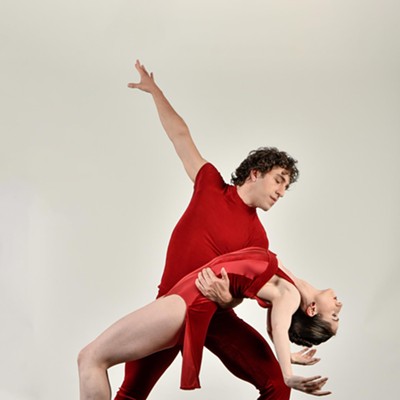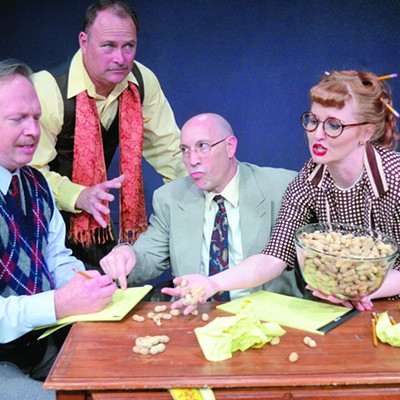That's the whole point of the Polyphonic Spree's symphonic rock spectacular, and, luckily, it's headed our way Saturday, Nov. 3, at the Rialto Theatre. The Spree will touch you in places you didn't know you had, and you'll be glad about it.
Sound sappy? Skeptics, bring it on!
The onstage energy of these 27 musicians--including a choir--effects magical transformations night after night. Not for nothing were they invited to perform as part of the Nobel Peace Prize events in 2005, and became the darlings of David Bowie, who not only took them on tour, but also booked them into two festivals he curated. You may even have heard them on the soundtrack of the movie Eternal Sunshine of the Spotless Mind and on the MTV reality series Life of Ryan.
I first saw them at the 2003 South by Southwest Music Conference (SXSW), four days before the U.S. invaded Iraq. The impending war already had all but torpedoed the party atmosphere of the conference; attendees were even encouraged to join a protest march. But on the last night, from the outdoor stage at Stubb's Bar-B-Que, the Polyphonic Spree engaged about 1,000 people in what amounted to an irresistible, virtual hug-in, a celebration of life, hope and community in the face of what was to come. Two dozen performers in choir robes laughed, shouted joyfully and leapt in the air again and again with their instruments, individually and en masse. The crowd sang along, simple words of affirmation, a chorus of 1,000 against the night. And I, who would've counted myself a skeptic, having seen about everything a rock venue had to offer, repeatedly fought back tears.
It remains to this day one of my top three concert experiences.
The live performance is so powerful, so audience-dependent, that the Spree's ability to capture the experience on record is more problematic, by several orders of magnitude, than it is for most bands. Band founder Tim DeLaughter concedes the problem. "That element of the thing that you cannot put your finger on," he says, "the magical moment in our live performance ... it's pretty spectacular and special, and that is impossible to get on a record. What you can do to get close to (it) ... is the actual sonic energy, the kind of explosiveness that does happen in the live show."
DeLaughter believes they have captured that sonic energy in their third release, 2007's The Fragile Army, and that the disc might even bring some much-needed commercial exposure to plump up the band's tenuous budget. (Just think for a minute about the expense of tour support for 27 musicians and their gear.)
"This record ... is as close as we've come to being able to participate in the commercial market," he says. "Our songs are, like, three minutes long, and what we wanted to make was an urgent rock record. It just so happens it's the most accessible record for radio we've got. We've had some success with the first single, 'Running Away.' We've got the second single, 'We Crawl,' and we'll see what happens with them. I'm kinda crossing my fingers. We've never really had commercial support."
The songs are catchy and upbeat, but The Fragile Army comes closer to the dark side, too, than any of the band's previous work. DeLaughter says, "As a songwriter, you kind of have to have your head in the sand not to be thinking about what's going on."
His lyrics swathe malaise in metaphor, though, and you really have to be looking for it. The title track, for instance, seems to liken the plight of U.S. soldiers in Iraq to being put on hold, and hints that their fate is in the hands of people formulating policy in a virtual world rather than the real one. Musically, The Fragile Army finds the Spree returning to its pop-rock roots, in the wake of a psychedelic detour facilitated by a short stint on Disney's Hollywood Records imprint.
Although the Polyphonic Spree began mostly as a performance-art piece reminiscent of '60s "happenings," DeLaughter says fans' demand for recordings inspired him and the band to take their musical identity more seriously. The Spree always has comprised first-chair-worthy musicians, playing a daunting array of instruments: the expected drums, bass and electric guitars, plus trombones, trumpets, harp, flute, French horn, theremin, flute, percussion and electronic effects. Miraculously, although the musicians have backgrounds in improvisational music, there is no competition to be heard, and the result is cohesive.
"These are great musicians. Everyone kind of self-edits, and they don't move into other people's sonic territory. There's nothing chaotic about it. The only thing that can be chaotic is the amount of energy during a live show, and that can go anywhere, but musically speaking, it's extremely organized." The reason, DeLaughter says: "We're all in it for the common good of the song."
It's so easy to be skeptical in these times, even more so than it was at SXSW 2003. So much has happened to reinforce our sense of evil in the world. And above all of that, we now have a sense of irretrievable loss. How disappointing to learn that, in the course of promoting The Fragile Army, the Polyphonic Spree have traded their choir robes for militaristic uniforms! Has the band capitulated to the antagonism that characterizes our times? Not bloody likely, but you'll need to see the show to learn the denouement. Trust me: You need this.












